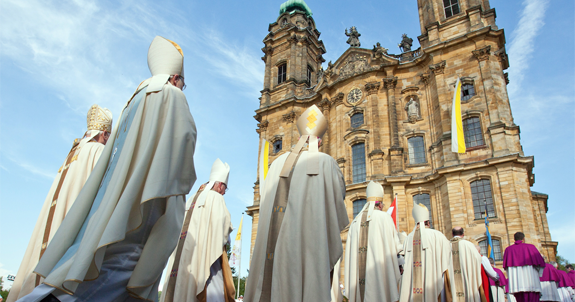ONE HOLY CATHOLIC AND APOSTOLIC CHURCH
ONE HOLY CATHOLIC
AND APOSTOLIC CHURCH
Our Holy Father,
Pope Francis, recently created twenty-one new cardinals for the Catholic
Church. According to Canon 349 in the
Code of Canon Law, “The cardinals of the Holy Roman Church constitute a special
college whose responsibility is to provide for the election of the Roman
Pontiff in accord with the norm of special law; the cardinals assist the Roman
Pontiff collegially when they are called together to deal with questions of
major importance; they do so individually when they assist the Roman Pontiff
especially in the daily care of the universal Church by means of the different
offices which they perform.”
Those who are
chosen must be men who have been ordained to the priesthood and to the
episcopate. They are to be “outstanding
for their doctrine, morals, piety and prudence in action” (Can. 351). Eighteen of the newly made cardinals are
under the age of eighty, which means that they are eligible to participate in
the conclave that elects a new pope. The
total number who are eligible to vote is currently 136, of whom 99 were created
cardinals by Pope Francis in nine consistories during his ten years as
successor to St. Peter.
Pope
Francis has been consistent in his desire to make the College of Cardinals more
representative of the universal Church by selecting clergy from all the regions
of the world. This new group of cardinals
are from fifteen different countries.
The Holy Father took note of their diversity of race and language in his
homily at their elevation on September 30, saying “Mother Church, who speaks
all languages, is One and is Catholic.”
Among the newly elevated is the first ever cardinal from South Sudan, Cardinal Stephen
Ameyu Martin Mulla of Juba. Two others
from Africa were elevated, Cardinal Stephen Brislin from Cape Town, South
Africa and Cardinal Protase Rugambwa of Tabora, Tanzania. The Catholic Church is experiencing great
growth in Africa, and the total percentage of cardinal electors from Africa is
now 14%, a rise of 5% since 2013. Asia
also is seeing growth. Under Pope
Francis, the cardinal-electors from Asia have increased from 9% to 16% of the
total. The percentage of cardinals from
Europe has decreased from 53% in 2013 to 39% today.
Italy no longer has
the control over conclaves that it had for centuries, although it still has
more cardinal-electors – fourteen – than any other nation. The second largest number from one country is
the United States, with eleven. Spain is
the third largest, with eight. (You can
look these numbers up on the Vatican Press Office website at www.vatican.va/news_services/press/index.htm.) The growing diversity of electors in the
papal conclave accounts, at least in part, for the fact that the last three
conclaves have voted for a non-Italian: John Paul II from Poland, Benedict XVI
from Germany, and Francis from Argentina.
However, Italian is still the common language of the Vatican, and anyone
who hopes to become pope needs to learn it!
Before John Paul II, the last non-Italian pope was a Dutchman, Pope
Adrian VI, who reigned for less than three years and died on September 14,
1523.
The diversity of the leadership at the highest level of the hierarchy in the Church, I believe, should be seen as positive. Cardinals are no longer chosen because of the particular see they occupy. More are being chosen from vibrant churches. There are exceptions, but most parish churches in Italy, France and Germany are empty on Sunday. In many African and some Asian nations the gathering places for Catholic Mass are overflowing. We call ourselves the Catholic Church, meaning “universal. We have all the means that God has given humanity for salvation – all the Sacraments, the fullness of the Word, and the Sacred Tradition. But Catholic also means, as the writer James Joyce wrote, “Here comes everyone!” From every land, language, and race.




Comments
Post a Comment